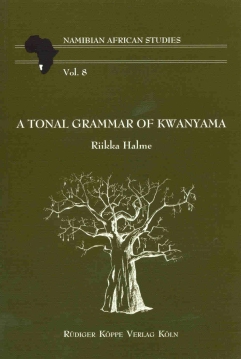
A Tonal Grammar of Kwanyama
A Bantu Language (R.21) of Namibia and South Angola
Author: Riikka Halme. Series edited by: Wilfrid H.G. Haacke.
Series: NAS Namibian African Studies Volume 8
200412 pp. Roman, 299 pp.
28 Tabellen, Anhang: Nominal Paradigms, Verbal Paradigms, 3 narrative Texts with interlinear glossing and English translation, Vocabulary Kwanyama-English
Text language(s): English
E-book
€ 69.80
Buy 'A Tonal Grammar of Kwanyama' as a downloadable PDF document directly from our online shop »
Kwanyama – Oshikwanyama (R.21) according to the official Namibian standard – is a Wambo language, and correspondingly belongs to the Bantu languages. It is spoken by far more than half a million people in South Angola and Namibia.
Certainly this number includes the speakers of other closely-related Wambo varieties in Angola. These languages have been studied relatively little, and the study of their tonal systems has been particularly neglected. The present book is the first sketch of Kwanyama grammar with a systematic account on tone. The main aim is to provide an analysis of the tonal system of this language. Therefore the study discusses both the lexical tone, i.e. tone as an inherent property of a lexeme, and the grammatical tone wich marks grammatical properties.
The author lived in a Kwanyama speaking community in Angola for about half a year and had the opportunity there to improve her linguistic competence. As a researcher she keeps to the tradition of Generative Phonology in the sense that there are rules that take the tone patterns from the underlying representation to a binary surface representation, i.e. tonemes.
In order to help the reader to follow the argumentation of the tonal analysis, this book is organised in such a way that the segmental and tonal levels are discussed separately, followed by discussions on tone in nouns, verbs and minor word categories. After that, the study is related to the wider context of research on Guthrie’s group R languages, especially the Wambo languages. Finally, the reader finds nominal and verbal paradigms as well as some texts, and a vocabulary Kwanyama-English comprising about 6,000 entries.
Review by Dirk Otten in Afrikanistik-Ägyptologie-Online 2006
The printed volume 8 of Namibian African Studies is out of stock / out of print. The dissertation version of the grammar is still available, see the link at the bottom.
Under these links you will find publications by the author, studies of tonology in African languages and descriptions of further southwestern Bantu languages and cultures:
Accompanying material:
- “Healing the Land” – Kaulinge’s History of Kwanyama
(ISBN 978-3-89645-051-7 ) - A Dictionary of the Rumanyo Language
(ISBN 978-3-89645-601-4 ) - A Grammar of Yeyi
(ISBN 978-3-89645-549-9 ) - A Grammatical Sketch of Rugciriku (Rumanyo)
(ISBN 978-3-89645-542-0 ) - Bantu Languages
(ISBN 978-3-89645-705-9 ) - Konzeptualisierung von Landschaft
im Mbukushu (K.333/K.43) Bantusprache in Nord-Namibia)
(ISBN 978-3-89645-600-7 ) - Lucazi Grammar
(ISBN 978-3-89645-038-8 ) - North-South Contributions to African Languages
(ISBN 978-3-89645-889-6 ) - The Bantu Bibliography
(ISBN 978-3-89645-181-1 ) - The Mbukushu in Angola
(ISBN 978-3-89645-350-1 )
Cross-reference:
- A Tonal Grammar of Kwanyama
(ISBN 978-3-89645-980-0 ) - Domains and Regions in Bantu Tense and Aspect
(ISBN 978-3-89645-772-1 ) - Issues in Bantu Tonology
(ISBN 978-3-89645-033-3 ) - Luba-Sprichwörter
(ISBN 978-3-927620-61-2 ) - Stress and Tone – The African Experience
(ISBN 978-3-89645-017-3 ) - Tone Systems in African Languages
(ISBN 978-3-89645-019-7 ) - Tonrelationen in Luba-Sprichwörtern
(ISBN 978-3-927620-62-9 ) - Wörterbuch Kinyarwanda–Deutsch
(ISBN 978-3-89645-588-8 ) - Zwischen Bantu und Burkina
(ISBN 978-3-89645-348-8 )
Reviews
Grammatiken mit ausgewiesenem Bezug auf Tonsysteme und tonale Strukturen sind für die Bantusprachen leider recht selten. Mit dem vorliegenden Werk von Riikka Halme liegt nun eine Untersuchung vor, die sich speziell der tonalen Analyse des Kwanyama widmet, [...] eine sehr gründliche Untersuchung [...]
Die von ihr im Rahmen der generativen Phonologie (bspw. Kenstowicz 1994) herausgearbeiteten Regeln sind logisch-konsequent aufeinander bezogen und nachvollziehbar. Das abschließende Kapitel, in dem das zuvor herausgearbeitete Regelwerk noch einmal eine kurze Zusammenfassung erfährt, bietet dem Leser eine Hilfestellung für den schwierigen Untersuchungsgegenstand.
Dirk Otten in Afrikanistik-online, www.afrikanistik-online.de/archiv/2006/303, 1-5
Riikka Halme’s monograph, „A Tonal Grammar of Kwanyama“, is an important contribution to the study of the Oshiwambo (Guthrie R.20) group of Bantu languages spoken in Angola and Namibia. Since tonal information on the languages of this group has been scanty, Halme’s broad and rigorous coverage is particularly welcome. […]
Halme’s data and presentation are uniformly rigorous and thorough, and her analysis is careful. Data that are (appear to be) quite complex, both phonetically and in terms of their interactions, are clearly presented in a straightforward and easy-to-follow format.
Thera Crane / Larry M.Hyman in Journal of African Languages and Linguistics, 28/1, 2007, 82-86
PDF documents:
 | NAS_08_Contents | (≈ 198 kB) |
| « back | Print version | [top] |
 Books
Books Audio
Audio Biographies
Biographies Series
Series Festschrifts
Festschrifts Journals
Journals